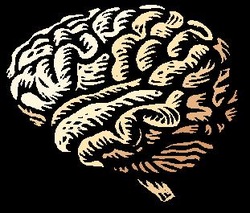Let's face it--aging is unavoidable. However, the negative stereotypes and expectations that growing older means becoming forgetful, and leading an inactive, dull life are just plain absurd! In fact, many people find their older adulthood is among the most satisfying times of their lives. They key to staying active and mentally engaged is quite simple and based largely on the "use it or lose it" principle. While there are environmental and genetic components to memory problems, you have an active role in staying healthy. As the saying goes--prevention is the best medicine.
This post will share information from two great resources on brain health and disease
prevention:
The Memory Bible: An Innovative Strategy for Keeping Your Brain Young by Gary Small
Brainfit: 10 Minutes a Day for a Sharper Mind and Memory by Corinne Gediman
This post will share information from two great resources on brain health and disease
prevention:
The Memory Bible: An Innovative Strategy for Keeping Your Brain Young by Gary Small
Brainfit: 10 Minutes a Day for a Sharper Mind and Memory by Corinne Gediman
Brain Cells: The Forest in Your Mind

The brain has billions of nerve cells that stretch out like the branches on a tree, growing smaller as they extend outward. These branches send messages to each other.
As our brains age, the synapses, or connections between these branches, begin to function less effectively.
Messages firing from one part of the brain to the other may break down. One area of your brain may tell you to walk into the kitchen and open the refrigerator, but then you just stand there. Unfortunately, the part of the brain that should have told you to reach in and get some water because you’re thirsty didn’t get the message.
Without use, the branches can shrink; but when we exercise them in new and creative ways, connections remain active as they pass new information along.
Remarkably, new dendrites can be created after old ones die.
BUT HOW??
Evidence shows we can “work out” our dendrites and extend their branches in many ways.
Even routine activities can create a trip to the gym for brain cells: tie your shoe backwards, brush your teeth with your nondominant hand, any conscious effort to tease your brain can potentially create new brain cell connections.
"Use It Or Lose It!" – Disease Prevention
Research shows that keeping your brain active over time can lower your risk for dementia. Scientists at Case Western University found a person's risk for Alzheimer's Disease was 3 times lower in when they had been intellectually active during their 40s and 50s compared to those who had not. Couch potatoes didn’t reap benefits of prevention. Passive pursuits like going to the movies and watching TV didn’t help lower risk.
Brain fitness can tone up our memory performance, protect us from future decline, and may even lead to new growth of brain cells.
Brain Fitness & Mental Aerobics
Any mental activity that stimulates your mind can help protect your brain.
Be creative and have fun!!
Crossword Puzzles Sudoku
Riddles Play charades
Jeopardy Take a Class or Learn a New Language
Jigsaw puzzles Play Cards or Board Games
Arts & Crafts: Painting, Knitting, Woodworking, Drawing, Photography
Evidence shows we can “work out” our dendrites and extend their branches in many ways.
Even routine activities can create a trip to the gym for brain cells: tie your shoe backwards, brush your teeth with your nondominant hand, any conscious effort to tease your brain can potentially create new brain cell connections.
"Use It Or Lose It!" – Disease Prevention
Research shows that keeping your brain active over time can lower your risk for dementia. Scientists at Case Western University found a person's risk for Alzheimer's Disease was 3 times lower in when they had been intellectually active during their 40s and 50s compared to those who had not. Couch potatoes didn’t reap benefits of prevention. Passive pursuits like going to the movies and watching TV didn’t help lower risk.
Brain fitness can tone up our memory performance, protect us from future decline, and may even lead to new growth of brain cells.
Brain Fitness & Mental Aerobics
Any mental activity that stimulates your mind can help protect your brain.
Be creative and have fun!!
Crossword Puzzles Sudoku
Riddles Play charades
Jeopardy Take a Class or Learn a New Language
Jigsaw puzzles Play Cards or Board Games
Arts & Crafts: Painting, Knitting, Woodworking, Drawing, Photography
MENTAL AEROBICS SHOULD BE FUN!!!!
Most of us put our minds to coping with real problems in our daily lives—jobs, health, family, etc—yet many of us find time to enjoy solving puzzles and playing games. It is this fun factor that makes it easier to maintain mental aerobics over the long-haul.
Some final tips:
>>Choose a variety (cross-train!)---Minimize boredom and maximize results!
>>Build stamina over time; gradually introduce novel situations and new activities.
>>Stimulate your mind but don't overdo it.
>>If it's much too difficult, you may get frustrated and give up.
>>If it's much too easy, you may feel bored or distracted.
So go have some fun! It's good for you AND your brain!
Some final tips:
>>Choose a variety (cross-train!)---Minimize boredom and maximize results!
>>Build stamina over time; gradually introduce novel situations and new activities.
>>Stimulate your mind but don't overdo it.
>>If it's much too difficult, you may get frustrated and give up.
>>If it's much too easy, you may feel bored or distracted.
So go have some fun! It's good for you AND your brain!





 RSS Feed
RSS Feed
